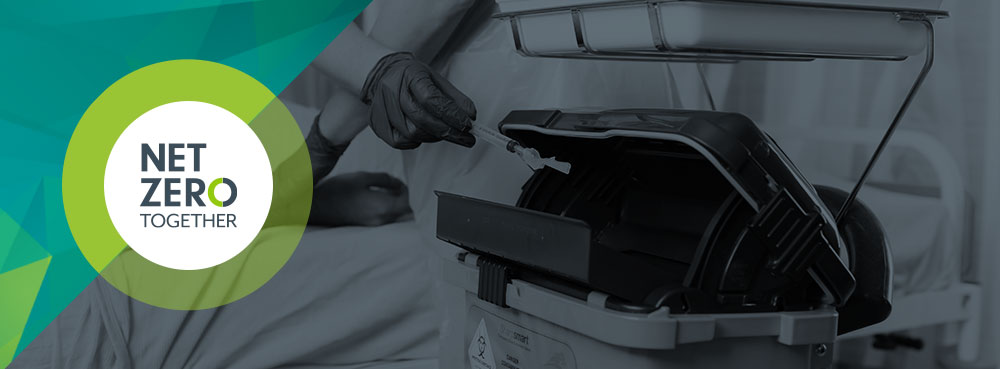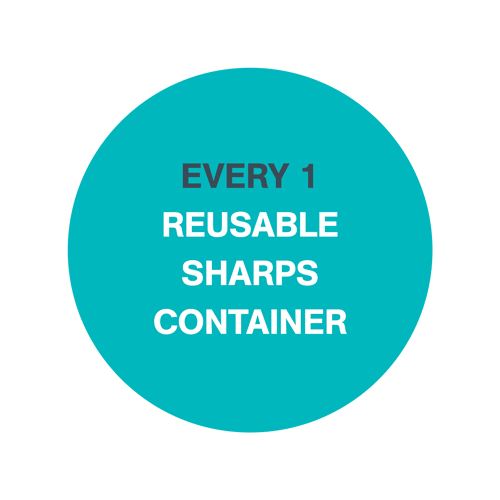Our Commitment to NHS Sustainability Goals

Sharpsmart has built its core business around making healthcare safer and more sustainable through the continued development of healthcare waste containment and treatment systems. Over the years we have partnered with the National Health Service (NHS), the wider healthcare market and NHS Supply Chain to drive sustainable outcomes, from plastic reduction to waste diversion and recovery. In 2020, the NHS announced their ambition to be the world’s first net zero national health service, committing to reach net zero by 2040 and targeting its supply chain to reach net zero by 2045. To support the NHS with its sustainability goals, we have also committed to achieving net zero by 2040 which will include building a sustainable value chain with the objective of a truly circular economy.
TOPICS WE WILL COVER:
1 / What impact does healthcare waste have on carbon emissions?
2 / What Net Zero means to the NHS
3 / Our commitment to NHS sustainability goals
4 / Sharpsmart's Net Zero commitment
5 / Our carbon strategy process so far
6 / Together on the route to Net Zero
What Impact Does Healthcare Waste Have on Carbon Emissions?

When considering the impact healthcare waste has on a hospital’s carbon footprint, it’s important to consider the waste hierarchy and the entire life-cycle of the waste in question. Whilst waste disposal by itself makes up only a small percentage of the NHS route to net zero, it’s more complex than just disposal alone.
Efficient waste management is about following the hierarchy of waste and ensuring hospital trusts procure goods in a way that minimises their carbon footprint. One example is clinical and sharps waste containers, evaluating their carbon footprint throughout their manufacture, transport and disposal life-cycle, eliminating the reliance on single-use plastics such as disposable waste containers.
Studies such as Sharpsmart: “Impact on Life-Cycle Carbon Footprint” published in the British Medical Journal Open have shown the significant impact clinical waste containers can have on carbon emissions when taking the full life-cycle into account; from the production of raw materials and manufacturing to transportation, cleaning, treatment and disposal.
Another area of healthcare waste that has a huge impact on carbon emissions is the high volumes of waste being sent for high-temperature incineration, which is a significant contributor to greenhouse gas emissions.
Despite waste disposal perhaps being a small percentage on the surface of the NHS route to net zero, it’s clear that waste does have a huge part to play.
What Net Zero Means to the NHS
With the threat of climate change growing increasingly more concerning and the health and care industry in England responsible for 4-5% of the country’s carbon footprint, it’s become clear that change is needed to reduce the impact it’s having on both public health and the planet.
On 1 July 2022, the NHS made a commitment to becoming a greener organisation and became the first health system to embed net zero into legislation, through the Health and Care Act 2022.
This legislation puts the responsibility on NHS England and all of its associated healthcare organisations to help reach the sustainability goals set by the government. It also requires NHS service providers and decision-makers to take steps to address climate change impacts; as outlined in the 2008 Climate Change Act.
The Sustainability Goals of the NHS
To reach its goal of becoming the world’s first net zero national health service, the NHS has set two objectives:
- For emissions the NHS directly controls: Reach net zero by 2040, with an ambition to reach an 80% reduction by 2028 to 2032.
-
For emissions the NHS can influence: Reach net zero by 2045, with an ambition to reach an 80% reduction by 2036 to 2039.
The thinking behind the objectives set by the NHS for their sustainability goals was to create targets that were as ambitious as possible but remained realistic and achievable within the set timeframe.
Our Commitment to NHS Sustainability Goals
Sharpsmart has been proactively providing a product and service that is both safe and sustainable for over 20 years. In that time, we’ve partnered with hospital trusts all over the UK working together to achieve the highest standards of sustainability and carbon emission reductions in the industry.
We’re constantly working to improve waste segregation throughout the NHS and supporting new waste streams to divert a higher volume of waste away from landfill, treatment and high-temperature incineration. Our extensive experience providing services in every area of a hospital enables us to manage all types of healthcare waste and always use the best practices of management, disposal, treatment and recovery. Our partnership approach has us working with the NHS to develop auditable and reportable waste plans and milestones that help deliver improvements related to safety, efficiency and carbon footprint reduction.
Working within the four walls of the hospital, we deliver much more than the traditional ‘waste collection’ approach that healthcare waste companies generally provide; our consultants are on-site conducting waste audits, KPI management strategies and staff training.
We further support the NHS by identifying resources being disposed of that can be either recovered, recycled, or sent for alternative treatment, while also working to eliminate all single-use plastic and packaging associated with containers for sharps and clinical waste.
By aligning with NHS and industry partners, we’re consistently forward-thinking and working towards developing new innovations in sustainable waste management; further supporting our partners by providing sustainability education and messaging that’s clear and easy to understand. We offer total transparency and visibility of the CO2 generation across our business and related services which enables us to analyse the data and take action where and when needed.
Sharpsmart’s Net Zero Commitment
To further support the NHS and the global drive to reverse the damaging impacts of climate change, we’ve developed our own route to net zero strategy, committed to achieving net zero emissions by 2040.
We began by investing in external consultants to help us develop a strategy and a software system that enabled us to evaluate our data, understand it, and learn which immediate improvements we could make and continually assess going forward.
With our strategy developed and our initiatives outlined, we sought support from UK management and the global board and began promoting our net zero strategy with internal and external stakeholders, from our own employees and management teams to our customers and suppliers. The Sharpsmart sustainability playbook outlines three key objectives to help us achieve net zero:
Net zero carbon emissions
Through the innovation and implementation of new systems and technology, we’ll strive to reduce our internal carbon emissions to ‘net zero’; which includes cutting our energy and fuel use, switching to low-carbon energy sources and offsetting any residual carbon emissions.
Zero waste to landfill
We’ll strive to eliminate, and/or divert all waste streams away from landfill and into the most sustainable outlets available. Our teams are already working closely with NHS partners to optimise their waste management systems and improve the segregation process, using the right containment and disposal solutions.
As well as our disposal, recovery and recycling initiatives, we’ve set up a dedicated department and have been working with industry partners looking at outlets and sourcing to ensure that all the healthcare waste we manage follows the most sustainable route.
Build a sustainable value chain
To achieve our objectives and provide all of our partners with a truly circular economy, we’ll be collaborating with our supply chain to advance sustainable products, processes and technologies, taking a whole value chain approach to sustainability. By identifying and selecting like-minded industry partners and supporting them to ensure they align with the net zero strategies of both ourselves and the NHS, we’re using procurement methods that prioritise sustainability.
Our Carbon Strategy Progress so Far
As well as having our route to net zero and carbon reduction plan mapped out, we’ve also identified and equipped key specialists within our organisation to manage and direct our strategy going forward. We’re continually analysing our generated emissions and have found that we’re currently ahead of where we expected to be with managing our carbon reduction. We began by tackling the areas that could have the biggest impact in the shortest period of time, identifying the quick wins to help us execute our short-term strategy. Going forward, we’ll continue investing and developing innovations to ensure that we’re aligned with the medium and longer-term goals of our strategy.
Together on the Route to Net Zero
Sharpsmart has been dedicated to increasing sustainability and developing green solutions in the healthcare waste industry for over 20 years; partnering with hospital trusts throughout the UK to significantly reduce carbon emissions with proven results. As industry leaders in innovation and waste management practices that minimise ecological impact, our solutions include state-of-the-art technology, reusable products, and educational tools that encourage positive change. If you’d like to learn more about our commitment to NHS sustainability goals, or would like to know how we can help you on the route to net zero, get in touch today.
